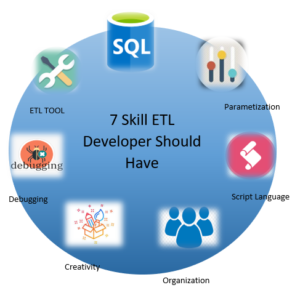One can use data for various purposes, including data analysis and creating machine learning datasets. However, data cannot be used in its raw form. For this, we need data processing systems. A data processing system extracts information from storage and transforms it into a form that can be used by humans and machines. During this process, it is known as extraction, transformation, and loading (ETL). In most cases, this is done by a highly specialized engineer called an ETL developer. By organizing data in the correct way, ETL developers can make life easier for data teams.
The skill ETL developer should have:
1.ETL Tools/Software
ETL developers need a tool to develop ETL processes. An ETL Developer can create mappings that usually takes few hours to complete as compared to traditional software development process which requires a team of 3-4 engineers at least a week’s time write code from scratch for the same mappings. These tools provide a graphical interface for the developer, usually drag, and drop, so the developer can see the entire workflow from source to target. Popular ETL tools include Talend and Informatica.
2.SQL
Structured Query language (SQL) is the backbone of ETL as it is lifeblood of database language. PL/SQL, big queries, and other query languages are also available, but SQL is most commonly used for businesses. As a matter of fact, most of the ETL Tools are just SQL generators behind the scenes, so it’s important to be able to use both interchangeably.To know about SQL please go through this link
3.Parameterization
SQL parameters enable you to use parameters in SQL queries rather than constant values. A parameter only takes effect when the query is executed, allowing the query to be reused with different values and for different purposes. The ability to parameterize your ETL jobs can save you a great deal of time. You can change certain aspects of your ETL jobs without modifying the job itself. To avoid duplicating work across multiple environments, you would simply change the environment parameter instead of creating a new job for each one. As a result, the ETL developers save time, and therefore the client or business saves money.
4.Scripting language
In certain situations, ETL tools may not be able to complete the requirement, so developers need to dig into the system they’re working with. Scripting languages can help developers manage files, directories, and permissions to make ETL easier. ETL scripts can be written in many different languages, such as Python and Bash.

5.Organization of Tasks/Projects
An ETL Developer has many tasks to perform during a sprint or project. A developer who is good at organizing and managing projects is always going to be a huge asset. The organization of tasks is crucial for ETL developers. You must not only organize the tasks that you are doing, but also organize the ways in which you are mapping your tasks. Keeping things organized and structured will help managing and debugging processes easy. Many businesses have already implemented some standards for development, maintenance and debugging ETL projects and tasks. Establishing your own standards is a key part of maintenance and consistent development.
6.Creativity
Whether you believe it or not, creativity is a huge advantage in the development field. In many cases, the STTM (Source to Target Mapping) document will outline what an ETL developer needs to do. However, you may not have this document, so you will have to create the mappings from scratch. When it comes to using different ways of programming, being able to think outside the box and come up with ideas that other developers may not come up with makes the job easier, and more enjoyable!
7.Debugging/Problem Solving
ETL Development is a dynamic process, so the first time you run a job or update an existing mapping, nothing is ever as planned. If you are providing production support, the business/client will want the problem resolved in a certain amount of time. This is because these jobs are crucial for the business to function well. The rest of this list plays a role in being an effective problem solver: having an organized standard and the ability to use your ETL tool can streamline the process.
To read article on snowflake here


Certainly a very helpful blog. Good job, Aditi ..
Great information Aditi..keep it up
It’s good article and usefull to increase knowledge.
Anyone without computer background can read this and get good knowledge.
Very useful information, anyone can easily get an overview on ETL Developers role and skills required.
Awesome job Aditi!! Something very precise, subtle and comprehensive. Indeed overwhelmed reading it. Happy Learning 🙂
Nice and informative.. thanks for sharing
Great article